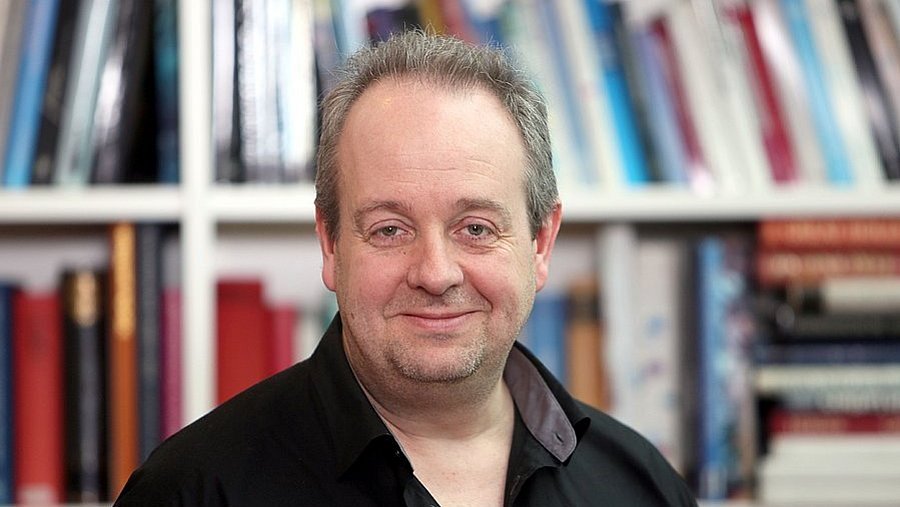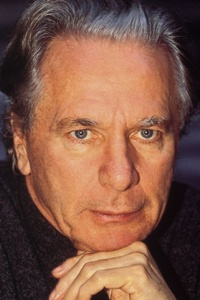
100th birthday of the composer Maurice Jarre
Christoph Spengler / Director of the choir and orchestra of the University of Wuppertal
Photo: Sergej Lepke
The electrical engineer who changed film music
Church music director Christoph Spengler on the composer Maurice Jarre
The French composer Maurice Jarre was born on 13 September 1924. He is best known to many cinema-goers for his film music. What did he compose?
Spengler: Maurice Jarre's oeuvre was incredibly diverse, so the list of film scores is long. Here is a subjective selection of the best-known films for which he composed the music: "Lawrence of Arabia" (1962), "Doctor Zhivago" (1965), "Journey to India" (1984), "Dead Poets' Society" (1989), "Gorillas in the Mist" (1988) and "Ghost - Message from Sam" (1990). In total, he has composed the music for over 150 films, covering an astonishing variety of genres. One of the reasons he was so popular as a composer was that he always succeeded in capturing the atmosphere and, above all, the emotions of the films so well, while also taking unusual paths - for example in his choice of instruments.
Before his film music career, he had already worked for 12 years for renowned French theatre productions. And despite his initial film successes, he was only to be the understudy for Laurence of Arabia. Why?
Spengler: Director David Lean's first choice for the film "Lawrence of Arabia" was the British composer Sir William Walton, who was very well known for his opulent and dramatic compositions, which seemed appropriate for this film epic. Malcolm Arnold was also considered. However, there were scheduling conflicts with both composers, so they were not available. So Lean decided to give Maurice Jarre a chance. Jarre had previously worked mainly in France and had not yet achieved an international breakthrough, so Lean was initially sceptical about entrusting him with this major project. He was given just six weeks to write two hours of orchestral music. The music was recorded by the London Philharmonic Orchestra. Sir Adrian Absolut is credited as the conductor in the film credits, but in reality he had great difficulty in keeping to the complex time signatures of the individual pieces, so that he was replaced by Jarre as conductor during the course of the recording. The music earned Maurice Jarre his first Oscar and is now regarded as one of the greatest film scores ever. It ranks third in the American Film Institute's top 25 film scores.
It has won the Oscar for best film score three times. An unusual instrument, the so-called Ondes Martenot, also plays a role. What kind of instrument was that?
Spengler: The Ondes Martenot - which translates as "Martenot waves" - is a monophonic electronic musical instrument introduced in 1928 and named after its inventor Maurice Martenot. In the original version, it is operated with a ring that sits on a wire and is moved parallel to a keyboard underneath, which is only used for visual orientation. The ring is operated with the right hand, while the left hand can control the volume and sound. The sound is somewhat reminiscent of a singing saw. Important French composers of the 20th century used the Ondes Martenot, including Olivier Messiaen, Darius Milhaud, Arthur Honegger and Edgar Varèse. Maurice Jarre and Elmer Bernstein are probably the best-known film composers who used the instrument for their music. It is typical of Maurice Jarre that he did not use the instrument simply because it was new, but because he wanted to capture certain moods of the films with the sound, for example the mystical desert landscapes in "Lawrence of Arabia", the threatening mood in "The Night of the Generals" or a transcendent sound in "Jesus of Nazareth".

Maurice-Alexis Jarre
Photo: public domain
His song "Lara's Theme" from the film "Doctor Zhivago" won the "Peoples Choice Award" in the USA as the "best song of all time". What makes it so special?
Spengler: I think there are several reasons for that. The first thing that strikes me as a musician is the sophisticated instrumentation, which is also a typical feature of Jarre's music. For example, he uses a balalaika to support the melody in order to capture a Russian local colour. In addition, the orchestration is quite opulent with strings, woodwinds, horn, harp, piano and soft percussion instruments. Overall, this also creates a great emotional depth and carries the incredibly memorable melody wonderfully. The melody itself is not banal, but surprises with chromaticism and harmonic twists. On the one hand, the effect is very romantic, while at the same time evoking nostalgic emotions. The piece has inspired many musicians across styles to reinterpret it, which has naturally made it even more popular.
As so often in life, he decided to study music against his father's wishes, even though he couldn't play a note on the piano. What did he study?
Spengler: Maurice Jarre initially studied electrical engineering - hence his openness towards electronic instruments. However, he soon decided to enrol at the Conservatoire de Paris, one of the most renowned music academies in France, against his father's express wishes. He had renowned teachers there, including the important composer Arthur Honegger. In addition to studying composition, he chose percussion as his main instrument.
He also composed for Volker Schlöndorff's film "The Tin Drum", based on the novel by Günther Grass. In the film, he was asked to orchestrate a potato and found a Polish instrument, the fujara. What do you do with it?
Spengler: The fujara is a long, vertically held flute that is traditionally played by shepherds in Slovakia. The sound is woody, you can produce deep, warm tones, but also rather buzzy overtones. Maurice's use of this instrument in the film "The Tin Drum" is probably partly due to the fact that, as in many of his musical works, it creates a link to the location of the film's plot - a large part of the action takes place in Gdansk on the Polish Baltic coast - and partly because the deep, melancholy sound suits the dark and surreal mood of the film. The Fujara is used to great effect, particularly in scenes in the film that explore the themes of innocence and loss.
Experts say he has a flair for the epic and monumental. Is that true?
Spengler: Well, you only have to look at the films for which Maurice Jarre was commissioned as a composer to realise that directors were aware of his ability to write exactly the right music for them. He had an incredible feel for empathising with the emotion and drama of a film and making it the basis of his composition. He was always on the lookout for ways to make the music unique, especially by choosing special instruments that matched the setting or atmosphere of the film. Like many other great film composers, he also used a large orchestration as a basis, which per se allows for an epic breadth. His good knowledge of percussion instruments also helped him to use them effectively and to heighten the drama. His compositional skills enabled him to build up tension over long periods of time, culminating in climaxes.
In the 80s, he also worked with synthesiser effects. But his son was more successful with that, wasn't he?
Spengler: Maurice Jarre did indeed break new ground in the 80s by using pure synthesiser music in films such as "The Only Witness", which represented a major break from his previous work. His aim was to explore new soundscapes and further develop his musical style. But here too, it was less an end in itself that drove him than his view that these new soundscapes could better capture the atmosphere of the specific films from his point of view. A "modern" film like "The Only Witness" also needed "modern" music that had to integrate sounds from our time.
His son Jean-Michel developed this idea further and composed entire albums of purely synthetic music without the use of classical instruments. He thus created a completely new world of sound, which was extremely successful commercially and became the basis of a new genre. However, it seems to me that a major difference between father and son is that the father was always looking to capture and support the emotions of images, while Jean-Michel created his very own art form of electronic music.
In his later years, he devoted himself primarily to symphonic music. What do you associate with him?
Spengler: What inspires me about Maurice Jarre is indeed his feel for the very specific film for which he is composing. When you listen to several of his scores, it's less obvious than with other composers that they were written by the same person. There are few film composers who are as versatile as he was. Often just a few bars are enough to conjure up not only images, but also the location, the atmosphere and the emotions of a particular film. In my opinion, this is what makes him so special. It makes his music timelessly beautiful, and I'm sure it will last a very long time.
Uwe Blass
Christoph Spengler studied church music in Düsseldorf. He took over the direction of the university choir in 2007 and the orchestra in 2011. In 2016, the rectorate awarded him the University of Wuppertal's Medal of Honour. In 2017, he was appointed church music director by the Protestant Church in the Rhineland.
